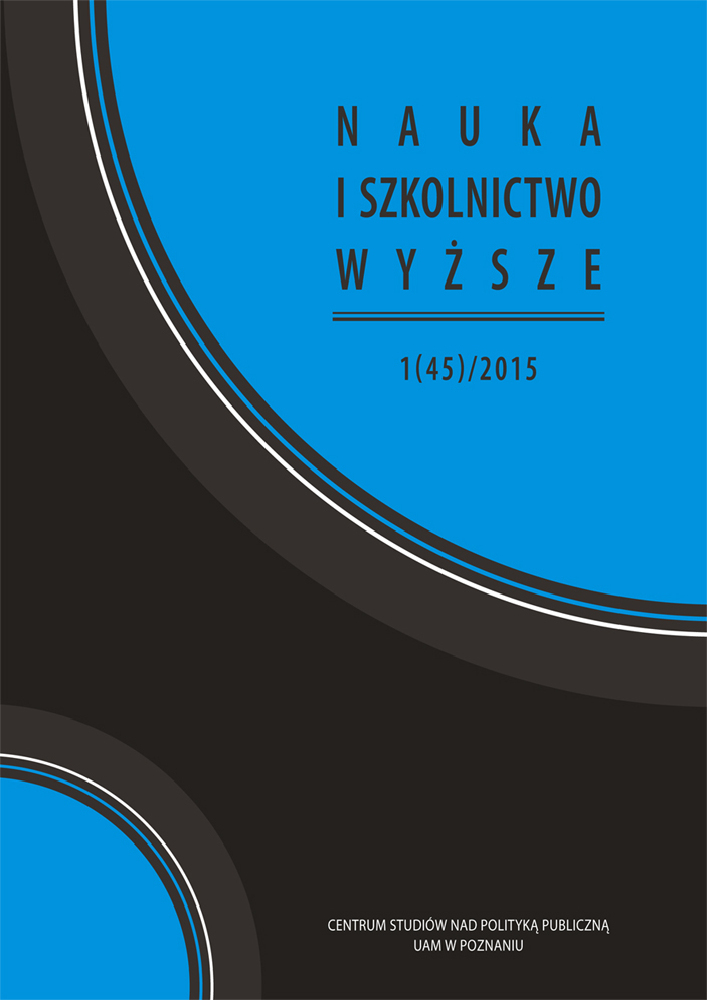Abstract
The public system of higher education in Poland is widely seen as “ill” – incompatible with the aims assumed by its stakeholders. There is agreement as to the existence of the problem, but no agreement on the diagnosis or courses of treatment. The diagnosis presented in this article is based on a two-year study of higher education elites – academic leaders and government policymakers. The author proposes that a possible cause of the “illness” can be understood through the medical term of polypragmasia – a situation when a sick patient consults different doctors who provide different diagnoses and prescribe different medications that produce undesirable interactions. The university is “sick” because the Ministry of Science and Higher Education and academic leaders give it different “diagnoses” and prescribe different “medications.” While academic leaders emphasize the role of the university in pursuing truth, policymakers see it primarily as an engine of economic growth. In effect, the aims pursued by academic leaders differ from those assumed in recent Polish legislation, and stimuli stemming from political channels encourage behaviors incompatible with the academic ethos. Research findings suggest three areas of potential synergy that could become turning points towards a self-transformation of Polish higher education: elite education, merit-based funding of academic research, and “soft skills.”References
Aberbach, J.D., Rockman, B.A. (2002). Conducting and coding elite interviews. Political Science & Politics. 35(4): 673-676.
ASBIRO (2014). Jedyna szkoła, w której uczą wyłącznie przedsiębiorcy [The only school where all teachers are entrepreneurs]. http://www.asbiro.pl/ [4.04.2014].
Balcerowicz, L. (2014). Jakość i efektywność w szkołach wyższych a systemy ich finansowania. Kongres Kultury Akademickiej. Kraków: Uniwersytet Jagielloński.
BBVA (2011). International Study on Scientific Culture: General Attitudes to Science. BBVA Foundation Department of Social Studies and Public Opinion. http://www.fbbva.es/TLFU/dat/culturacientificanotadeprensalarga.EN.pdf [30.12.2015].
Bendyk, E. (2008). Płacz nad trumną. Polityka. http://www.polityka.pl/tygodnikpolityka/kraj/251169,1,placz-nad-trumna.read [30.12.2015].
Dexter, L.A. (1970). Elite and specialized interviewing. Colchester, UK: European Consortium for Politcal Research.
Dybczyński, A. (2011). Jestem baronem. Nie chcę dłużej żyć w średniowieczu. Gazeta Wyborcza http://wroclaw.gazeta.pl/wroclaw/1,35751,9022221,Jestem_baronem__Nie_chce_dluzej_zyc_w_sredniowieczu.html [30.12.2015].
Dziewitek, P. (2014). Kolejny krok w tył we współpracy UMK i NGO. Stowarzyszenie Pracownia Obywatelska. http://pracowniaobywatelska.pl/kolejny-krok-w-tyl-we-wspolpracy-umk-i-ngo/ [30.12.2015].
Financial Times. (2013). Business school rankings from the Financial Times – Kozminski University.http://rankings.ft.com/businessschoolrankings/kozminski-university-warsaw/ [data].
Fullan, M. (2001). The new meaning of educational change. New York: Teachers College Press. Fuller Buckminster (n/d). Buckminster Fuller Institute. http://www.bfi.org/about-bfi/updates/2014/03/countdown-begins [30.12.2015].
Geertz, C. (1973). The interpretation of cultures. New York: Basic Books.
Guba, E.G., Lincoln, Y.S. (2005). Paradigmatic Controversies, Contradictions, and Emerging Confluences. W: E.G. Guba, Y.S. Lincoln (red.). Handbook of Qualitative Research (191-215). Thousand Oaks, CA: Sage.
Hartman, J. (2013). Umarła klasa. Gazeta Wyborcza. http://wyborcza.pl/magazyn/1,132517,13885836,Umarla_klasa.html [30.12.2015].
Kwiek, M. (2012). Changing Higher Education Policies: From Deinstitutionalization to Reinstitutionalization of the Research Mission in Polish Universities. Science and Public Policy. 39(5): 641-654.
Marody, M. (2014). Etos, wartości i standardy w nauce akademickiej i „post-akademickiej”. Kongres Kultury Akademickiej, Kraków: Uniwersytet Jagielloński. http://kongresakademicki.pl/ [30.12.2015].
Menzel, H. (1978). Meaning: Who needs it? W: M. Brenner, P. Marsh, M. Brenner (red.). The social contexts of method (140-171). New York: St. Martin’s Press.
Modzelewski, K. (2014). Humanistyka akademicka – misja czy komercja i biurokracja? Kongres Kultury Akademickiej, Kraków: Uniwersytet Jagielloński. http://kongresakademicki.pl/[30.12.2015].
Newsweek (2014). Polacy na walizkach. Emigracyjny efekt domina. Newsweek. 23 marca. http://polska.newsweek.pl/emigracja-z-polski-gdzie-wyjezdzaja-polacy-newsweek-l,artykuly,282624,1.html [30.12.2015].
OECD (2011). Stat Extracts: Graduates by field of education. http://stats.oecd.org/Index.aspx?DataSetCode=RGRADSTY [30.12.2015].
OBOP (2013). 2 miliardy. Sposób na bezrobocie. Warszawa: Energy for Europe, s. 16. http://fede.org.pl/raport-2miliardy-sposob-na-bezrobocie/ [30.12.2015].
OBOS (2009). Rola wykształcenia i zmiany w jej społecznym postrzeganiu w latach 1993-2009 (BS/163/2009). Warszawa.
Ozminkowski, V. (2009). Uczelnie niższe. Newsweek. 5 grudnia. http://www.newsweek.pl/uczelnie-nizsze,49872,1,1.html [30.12.2015].
Pacholski, L. (2011). Byłem admirałem stojącej flotylli. Gazeta Wyborcza. http://wroclaw.gazeta.pl/wroclaw/1,35751,9058004,Leszek_Pacholski__Bylem_admiralem_stojacej_flotylli.html [30.12.2015].
Papuzińska, M. (2009). Kryzys polskich uczelni: Szkoły z kasą. Polityka, http://www.polityka.pl/kraj/analizy/303296,1,kryzys–polskich–uczelni.read [30.12.2015].
Schwandt, T.A. (2000). Three epistemological stances in qualitative inquiry: Interpretivism, Hermeneutics, Social Constructivism. W: N.K. Denzin, Y.S. Lincoln (red.). Handbook of qualitative research (189-213). Thousand Oaks, CA: Sage.
Sztompka, P. (2014). Uniwersytet współczesny: Zderzenie dwóch kultur. Kongres Kultury Akademickiej. Kraków: Uniwersytet Jagielloński. http://kongresakademicki.pl/uniwersytet-wspolczesny-zderzenie-dwoch-kultur/ [30.12.2015].
Tadeusiewicz, R. (2014). Humanistyka: hamulec i kierownica. Panorama Polskiej Akademii Nauk. t. 6, nr 18. http://panorama.pan.pl/s,humanistyka-hamulec-i-kierownica,122.html [30.12.2015].
Thomas, W.I., Znaniecki, F. (1927). The Polish Peasant in Europe and America. New York: Alfred A. Knopf.
